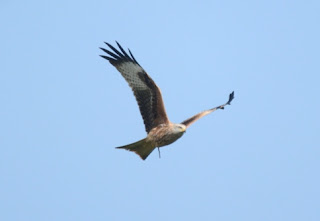I have expanded my range within the village having been told of a couple of areas which have horse paddocks that may be worth checking for wheatear, Redstart or even a Ring Ouzel. No luck so far but the migration season is in its early stages.
The greatest success of the year so far has been the recent influx of Red Kite that have passed over Puddletown Water Meadows. Eleven birds have been noted since the 17th March 2022 with only a single record before that on the 4th Jan 2022.
I have managed to photograph each bird using a Nikon d7100 with a Nikon AF-S 300mm fixed lens. This does produce a varying degree of results dependent on the height and proximity of each bird.
Red Kite has three plumages, Juvenile, Second plumage and adult. The general features are as follows:
Juvenile – Overall a more compact bird, broader wings, shorter tail with slight fork, brighter overall colour. Head white without streaking. The underwing is a lighter rufous colour than in adults.
Second – Usually identified from adults by retained juvenile feathers that are narrower and more pointed. A dark sub-terminal tail band is present.
Adult – Long narrow wings, long slim tail with deep fork. Rufous parts are much darker than in juveniles and breast has dark thick streaking.
Ref: Flight
identification of Raptors of Europe, North Africa and the Middle East by Dick
Forsman
On 31st a single bird:
At 1700 drifted in low overhead from the SW lingered over the meadows before departing E. The dark subterminal tail band is present. Some dark streaking on the breast. Some wear in outer primaries rounded feathers. This bird was looking to hunt prior to departing.
On 30th single bird:
At 1153 a single bird was picked up south of Athelhampton Road flying high W over Puddletown. This bird appeared to be migrating.
On 28th three birds.
Second Bird
At 1030 two birds together the first bird swooping down in the direction of the second bird before both flew off together E.
First bird shows brown streaking with long tail with deep fork. Second bird shows short primaries on left wing. Possible sub terminal band through tail.
At 1245 a single bird flew SW over the Water Meadows. This bird did not linger therefore appeared to be migrating.
On 26th March three birds.
At 0951 a single bird low E over the track at the E end of the Water meadows. Bird appeared to be hunting remaining low before departing.
White eye. Dark streaking noticeable through breast. Possible wear to outer tail feathers.
At 1045 a single bird low N over the water meadows. This bird flew a direct route giving the impression of migration.
At1058 a single bird flew E. A secondary is missing on the right wing but does not appear to be in moult as both wings would show a gap in the same place. Brown streaking in breast. Some wear in outer primaries. Sub terminal band in tail not obvious.
On 18th March a single bird.
At 1308 a single bird flew W from south of Athelhampton Road. Direct route taken giving impression of migratory route.
Long winged with long pointed tail. Other characteristics not clear in photo taken with sun behind the bird.
On 17th March two birds.
At 1330 two birds arrive over the meadows at different heights both joined up and flew SW. Once together gave impression of a migratory route.
The single bird showed some streaking on the breast a rufous shoulder and a long slim forked tail. The long wings and long forked tail is evident in the picture containing both birds.
Many of the birds were migrating whereas a few may have been hunting in the area. This does not preclude these birds from hunting during a migratory journey.


































